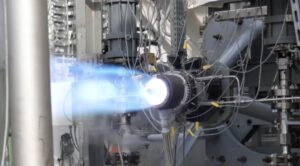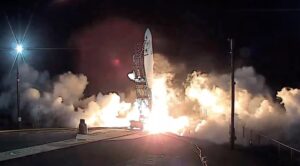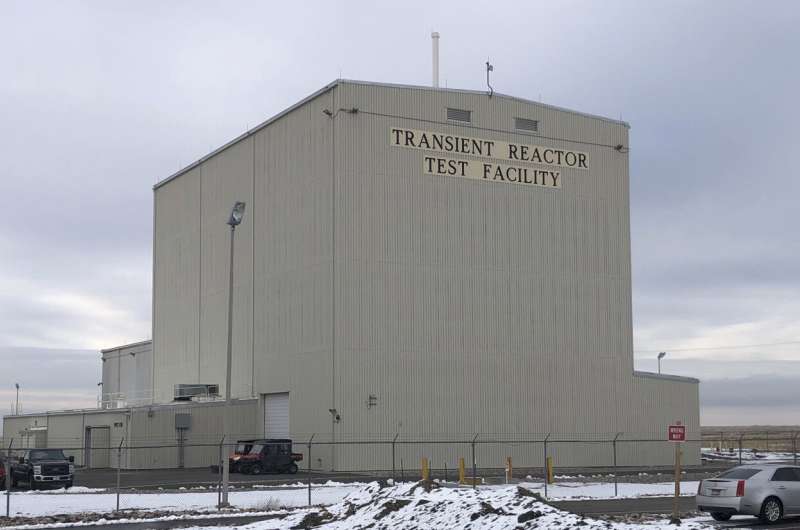US still characterizing damage of satellite struck in Russian missile test
Sunday, 21 November 2021 06:52
Washington DC (Sputnik) Nov 18, 2021
 The United States is still characterising the damage from an anti-satellite missile test allegedly conducted by Russia earlier this week, US Space Command Deputy Commander John Shaw said on Wednesday.
"We are still characterising this event. We expect the debris will grow over time," Shaw said.
The Deputy Commander explained that the debris will become a threat that will eventually h
The United States is still characterising the damage from an anti-satellite missile test allegedly conducted by Russia earlier this week, US Space Command Deputy Commander John Shaw said on Wednesday.
"We are still characterising this event. We expect the debris will grow over time," Shaw said.
The Deputy Commander explained that the debris will become a threat that will eventually h
 The United States is still characterising the damage from an anti-satellite missile test allegedly conducted by Russia earlier this week, US Space Command Deputy Commander John Shaw said on Wednesday.
"We are still characterising this event. We expect the debris will grow over time," Shaw said.
The Deputy Commander explained that the debris will become a threat that will eventually h
The United States is still characterising the damage from an anti-satellite missile test allegedly conducted by Russia earlier this week, US Space Command Deputy Commander John Shaw said on Wednesday.
"We are still characterising this event. We expect the debris will grow over time," Shaw said.
The Deputy Commander explained that the debris will become a threat that will eventually h Optus Selects Launch Partner for Next Gen Satellite
Sunday, 21 November 2021 06:52
Sydney, Australia (SPX) Nov 18, 2021
 Optus, Australia's largest and most experienced satellite owner and operator, has selected Arianespace to provide launch services for Optus 11, the replacement for its D1 Satellite.
The replacement of D1 is planned for 2023 and will see Optus' next generation satellite, Optus 11, launch into orbit. This next generation satellite, the Asia-Pacific region's first software-defined high throug
Optus, Australia's largest and most experienced satellite owner and operator, has selected Arianespace to provide launch services for Optus 11, the replacement for its D1 Satellite.
The replacement of D1 is planned for 2023 and will see Optus' next generation satellite, Optus 11, launch into orbit. This next generation satellite, the Asia-Pacific region's first software-defined high throug
 Optus, Australia's largest and most experienced satellite owner and operator, has selected Arianespace to provide launch services for Optus 11, the replacement for its D1 Satellite.
The replacement of D1 is planned for 2023 and will see Optus' next generation satellite, Optus 11, launch into orbit. This next generation satellite, the Asia-Pacific region's first software-defined high throug
Optus, Australia's largest and most experienced satellite owner and operator, has selected Arianespace to provide launch services for Optus 11, the replacement for its D1 Satellite.
The replacement of D1 is planned for 2023 and will see Optus' next generation satellite, Optus 11, launch into orbit. This next generation satellite, the Asia-Pacific region's first software-defined high throug CGI selected for GSA's ASTRO space and development IDIQ contract
Sunday, 21 November 2021 06:52
Fairfax VA (SPX) Nov 19, 2021
 CGI has been selected by the General Services Administration (GSA) for the multi-award ASTRO Indefinite-Delivery/Indefinite-Quantity (IDIQ) contract. This 10-year award provides CGI the opportunity to compete for task orders with an unlimited ceiling value to research, develop, support, maintain and operate manned, unmanned and optionally manne platforms and robotics, such as satellites, launch
CGI has been selected by the General Services Administration (GSA) for the multi-award ASTRO Indefinite-Delivery/Indefinite-Quantity (IDIQ) contract. This 10-year award provides CGI the opportunity to compete for task orders with an unlimited ceiling value to research, develop, support, maintain and operate manned, unmanned and optionally manne platforms and robotics, such as satellites, launch
 CGI has been selected by the General Services Administration (GSA) for the multi-award ASTRO Indefinite-Delivery/Indefinite-Quantity (IDIQ) contract. This 10-year award provides CGI the opportunity to compete for task orders with an unlimited ceiling value to research, develop, support, maintain and operate manned, unmanned and optionally manne platforms and robotics, such as satellites, launch
CGI has been selected by the General Services Administration (GSA) for the multi-award ASTRO Indefinite-Delivery/Indefinite-Quantity (IDIQ) contract. This 10-year award provides CGI the opportunity to compete for task orders with an unlimited ceiling value to research, develop, support, maintain and operate manned, unmanned and optionally manne platforms and robotics, such as satellites, launch Horiba Mira and GMV NSL collaborate on ESA project to improve road traffic efficiency
Sunday, 21 November 2021 06:52
Nuneaton UK (SPX) Nov 18, 2021
 Europe's leading automotive engineering consultancy, HORIBA MIRA confirmed that its collaboration with GMV NSL to develop new and improved passenger car platooning solutions on behalf of the European Space Agency (ESA) will move into a live trials phase in Q1 2022, encompassing both simulated and physical testing during 2022.
The ground-breaking project aims to advance platooning - the pro
Europe's leading automotive engineering consultancy, HORIBA MIRA confirmed that its collaboration with GMV NSL to develop new and improved passenger car platooning solutions on behalf of the European Space Agency (ESA) will move into a live trials phase in Q1 2022, encompassing both simulated and physical testing during 2022.
The ground-breaking project aims to advance platooning - the pro
 Europe's leading automotive engineering consultancy, HORIBA MIRA confirmed that its collaboration with GMV NSL to develop new and improved passenger car platooning solutions on behalf of the European Space Agency (ESA) will move into a live trials phase in Q1 2022, encompassing both simulated and physical testing during 2022.
The ground-breaking project aims to advance platooning - the pro
Europe's leading automotive engineering consultancy, HORIBA MIRA confirmed that its collaboration with GMV NSL to develop new and improved passenger car platooning solutions on behalf of the European Space Agency (ESA) will move into a live trials phase in Q1 2022, encompassing both simulated and physical testing during 2022.
The ground-breaking project aims to advance platooning - the pro Satellite cyber-security and ride-share algorithms tested on Australian rocket
Sunday, 21 November 2021 06:52
Brisbane, Australia (SPX) Nov 18, 2021
 Australian cyber security company BITSCore has successfully tested two sets of software algorithms on a sub-orbital rocket launched in Queensland, Australia, just a week after testing them on the International Space Station.
The software will help providers to upgrade onboard satellite cyber security as they join the 5G network, and allow satellite customers to request "ride-share" tasking
Australian cyber security company BITSCore has successfully tested two sets of software algorithms on a sub-orbital rocket launched in Queensland, Australia, just a week after testing them on the International Space Station.
The software will help providers to upgrade onboard satellite cyber security as they join the 5G network, and allow satellite customers to request "ride-share" tasking
 Australian cyber security company BITSCore has successfully tested two sets of software algorithms on a sub-orbital rocket launched in Queensland, Australia, just a week after testing them on the International Space Station.
The software will help providers to upgrade onboard satellite cyber security as they join the 5G network, and allow satellite customers to request "ride-share" tasking
Australian cyber security company BITSCore has successfully tested two sets of software algorithms on a sub-orbital rocket launched in Queensland, Australia, just a week after testing them on the International Space Station.
The software will help providers to upgrade onboard satellite cyber security as they join the 5G network, and allow satellite customers to request "ride-share" tasking Teledyne e2v HiRel offers new radiation dosimeters for space applications
Sunday, 21 November 2021 06:52
Milpitas CA (SPX) Nov 19, 2021
 Teledyne e2v HiRel has announced availability of 3 new radiation dosimeter models that further broaden its popular range of radiation measurement devices. Aimed at high altitude aerospace applications and all space applications from GEO satellites and LEO constellations to scientific exploration, each new model occupies minimal volume and adds only 17g weight to any mission.
For many space
Teledyne e2v HiRel has announced availability of 3 new radiation dosimeter models that further broaden its popular range of radiation measurement devices. Aimed at high altitude aerospace applications and all space applications from GEO satellites and LEO constellations to scientific exploration, each new model occupies minimal volume and adds only 17g weight to any mission.
For many space
 Teledyne e2v HiRel has announced availability of 3 new radiation dosimeter models that further broaden its popular range of radiation measurement devices. Aimed at high altitude aerospace applications and all space applications from GEO satellites and LEO constellations to scientific exploration, each new model occupies minimal volume and adds only 17g weight to any mission.
For many space
Teledyne e2v HiRel has announced availability of 3 new radiation dosimeter models that further broaden its popular range of radiation measurement devices. Aimed at high altitude aerospace applications and all space applications from GEO satellites and LEO constellations to scientific exploration, each new model occupies minimal volume and adds only 17g weight to any mission.
For many space SES orders 2 new sats for Prime TV Neighbourhood serving 118 million homes
Sunday, 21 November 2021 06:52
Luxembourg (SPX) Nov 19, 2021
 SES has ordered two geostationary (GEO) Ku-band satellites for its prime orbital slot at 19.2 degrees East to maintain the premium services it provides to its European video customers and to capture new opportunities in the region. These two replacement satellites - ASTRA 1P and ASTRA 1Q - will be built by Thales Alenia Space, a joint venture between Thales (67%) and Leonardo (33%) and are expec
SES has ordered two geostationary (GEO) Ku-band satellites for its prime orbital slot at 19.2 degrees East to maintain the premium services it provides to its European video customers and to capture new opportunities in the region. These two replacement satellites - ASTRA 1P and ASTRA 1Q - will be built by Thales Alenia Space, a joint venture between Thales (67%) and Leonardo (33%) and are expec
 SES has ordered two geostationary (GEO) Ku-band satellites for its prime orbital slot at 19.2 degrees East to maintain the premium services it provides to its European video customers and to capture new opportunities in the region. These two replacement satellites - ASTRA 1P and ASTRA 1Q - will be built by Thales Alenia Space, a joint venture between Thales (67%) and Leonardo (33%) and are expec
SES has ordered two geostationary (GEO) Ku-band satellites for its prime orbital slot at 19.2 degrees East to maintain the premium services it provides to its European video customers and to capture new opportunities in the region. These two replacement satellites - ASTRA 1P and ASTRA 1Q - will be built by Thales Alenia Space, a joint venture between Thales (67%) and Leonardo (33%) and are expec Planet to acquire VanderSat to deliver advanced agriculture data products to customers
Sunday, 21 November 2021 06:52
Haarlem, Netherlands (SPX) Nov 15, 2021
 Planet, a leading provider of daily data and insights about Earth, has entered into an agreement to acquire VanderSat, a leading provider of advanced earth data and analytics. VanderSat's innovative products help customers better measure and understand water management and crop health in major markets.
Planet intends to leverage VanderSat's technologies and products in further pursuit of b
Planet, a leading provider of daily data and insights about Earth, has entered into an agreement to acquire VanderSat, a leading provider of advanced earth data and analytics. VanderSat's innovative products help customers better measure and understand water management and crop health in major markets.
Planet intends to leverage VanderSat's technologies and products in further pursuit of b
 Planet, a leading provider of daily data and insights about Earth, has entered into an agreement to acquire VanderSat, a leading provider of advanced earth data and analytics. VanderSat's innovative products help customers better measure and understand water management and crop health in major markets.
Planet intends to leverage VanderSat's technologies and products in further pursuit of b
Planet, a leading provider of daily data and insights about Earth, has entered into an agreement to acquire VanderSat, a leading provider of advanced earth data and analytics. VanderSat's innovative products help customers better measure and understand water management and crop health in major markets.
Planet intends to leverage VanderSat's technologies and products in further pursuit of b NASA's Eyes on the Earth puts the world at your fingertips
Sunday, 21 November 2021 06:52
Pasadena CA (JPL) Nov 18, 2021
 The 3D real-time visualization tool lets users track NASA satellites as well as the vital Earth science data they provide. Recent upgrades make for an even more fascinating experience. NASA's real-time 3D visualization tool Eyes on the Earth got a recent upgrade to include more datasets, putting the world at your fingertips. Using the tool, you can track the planet's vital signs - everything fro
The 3D real-time visualization tool lets users track NASA satellites as well as the vital Earth science data they provide. Recent upgrades make for an even more fascinating experience. NASA's real-time 3D visualization tool Eyes on the Earth got a recent upgrade to include more datasets, putting the world at your fingertips. Using the tool, you can track the planet's vital signs - everything fro
 The 3D real-time visualization tool lets users track NASA satellites as well as the vital Earth science data they provide. Recent upgrades make for an even more fascinating experience. NASA's real-time 3D visualization tool Eyes on the Earth got a recent upgrade to include more datasets, putting the world at your fingertips. Using the tool, you can track the planet's vital signs - everything fro
The 3D real-time visualization tool lets users track NASA satellites as well as the vital Earth science data they provide. Recent upgrades make for an even more fascinating experience. NASA's real-time 3D visualization tool Eyes on the Earth got a recent upgrade to include more datasets, putting the world at your fingertips. Using the tool, you can track the planet's vital signs - everything fro Now back, space station astronauts recall the view, a crisis and peppers they grew
Sunday, 21 November 2021 06:52
Washington DC (UPI) Nov 15, 2021
 NASA's Crew-2 astronauts enjoyed spectacular views, camaraderie and fresh peppers grown in microgravity, but they also encountered challenging spacewalks and a crisis when part of the International Space Station malfunctioned, the four space flyers said Monday during a teleconference.
Astronauts Shane Kimbrough, Megan McArthur, Akihiko Hoshide and Thomas Pesquet gave their first p
NASA's Crew-2 astronauts enjoyed spectacular views, camaraderie and fresh peppers grown in microgravity, but they also encountered challenging spacewalks and a crisis when part of the International Space Station malfunctioned, the four space flyers said Monday during a teleconference.
Astronauts Shane Kimbrough, Megan McArthur, Akihiko Hoshide and Thomas Pesquet gave their first p
 NASA's Crew-2 astronauts enjoyed spectacular views, camaraderie and fresh peppers grown in microgravity, but they also encountered challenging spacewalks and a crisis when part of the International Space Station malfunctioned, the four space flyers said Monday during a teleconference.
Astronauts Shane Kimbrough, Megan McArthur, Akihiko Hoshide and Thomas Pesquet gave their first p
NASA's Crew-2 astronauts enjoyed spectacular views, camaraderie and fresh peppers grown in microgravity, but they also encountered challenging spacewalks and a crisis when part of the International Space Station malfunctioned, the four space flyers said Monday during a teleconference.
Astronauts Shane Kimbrough, Megan McArthur, Akihiko Hoshide and Thomas Pesquet gave their first p NASA Study Traces Decade of Ammonia Air Pollution in Africa
Sunday, 21 November 2021 06:52
Greenbelt MD (SPX) Nov 18, 2021
 A new NASA-led study is the first to document changing atmospheric ammonia (NH3) concentrations in Africa over an extended period. Ammonia is an air pollutant which can lead to heart and lung related illness. When present in excess in an ecosystem, it can make soil more acidic and hinder plant growth.
Ammonia is emitted naturally from soils and vegetation fires, but agricultural activities
A new NASA-led study is the first to document changing atmospheric ammonia (NH3) concentrations in Africa over an extended period. Ammonia is an air pollutant which can lead to heart and lung related illness. When present in excess in an ecosystem, it can make soil more acidic and hinder plant growth.
Ammonia is emitted naturally from soils and vegetation fires, but agricultural activities
 A new NASA-led study is the first to document changing atmospheric ammonia (NH3) concentrations in Africa over an extended period. Ammonia is an air pollutant which can lead to heart and lung related illness. When present in excess in an ecosystem, it can make soil more acidic and hinder plant growth.
Ammonia is emitted naturally from soils and vegetation fires, but agricultural activities
A new NASA-led study is the first to document changing atmospheric ammonia (NH3) concentrations in Africa over an extended period. Ammonia is an air pollutant which can lead to heart and lung related illness. When present in excess in an ecosystem, it can make soil more acidic and hinder plant growth.
Ammonia is emitted naturally from soils and vegetation fires, but agricultural activities Pangea Aerospace tests aerospike engine
Saturday, 20 November 2021 21:42
A European small launch vehicle startup has successfully tested a small version of an aerospike engine powered by methane and liquid oxygen it plans to scale up for use in an orbital vehicle.
Astra’s Rocket 3.3 reaches orbit on fourth attempt
Saturday, 20 November 2021 05:45
Astra Space’s Rocket 3.3 successfully reached orbit on a Nov. 20 launch, the fourth orbital launch attempt by the small launch vehicle startup.
ESA ministers approve strategy to work on terrestrial and space safety issues
Friday, 19 November 2021 23:49
The member states of the European Space Agency have endorsed a strategy to support work on terrestrial and space safety issues while also planning for future space exploration projects.
NASA seeks ideas for a nuclear reactor on the moon
Friday, 19 November 2021 20:44

